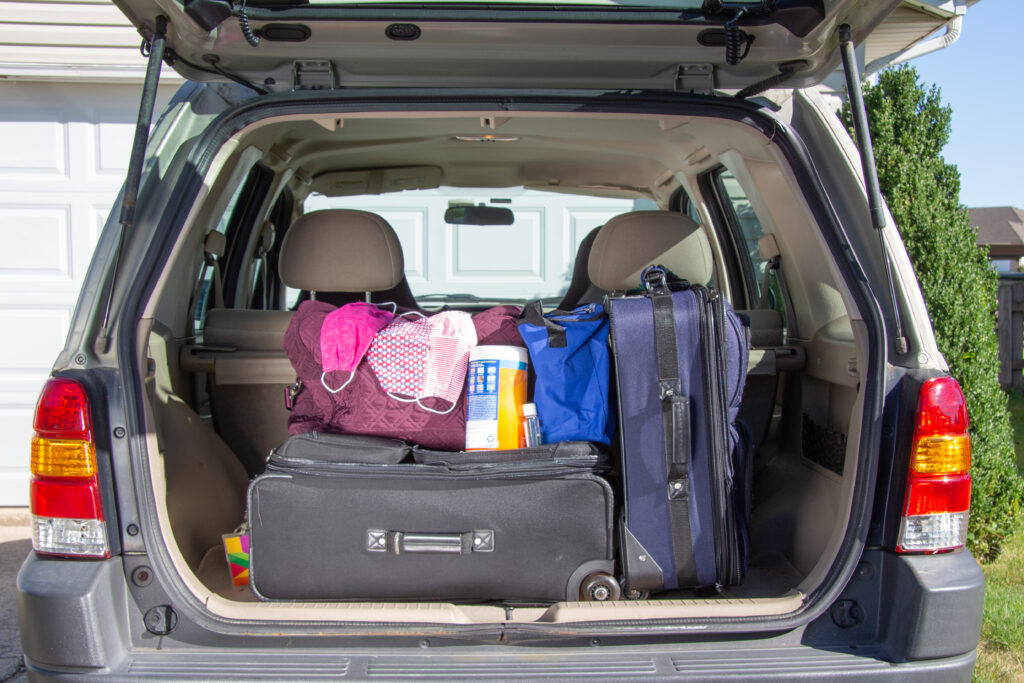After a year and a half of COVID-19 lockdowns, we were thrilled when the U.S.—and most of the world—reopened. But, with recent news of the Delta variant and breakthrough cases, we aren’t completely out of the woods yet. You can still enjoy a road trip, however, with some advanced planning and precautions. Here are six tips to help keep your COVID-19 road trips safe and fun.
This article may contain affiliate links through which we may receive a small commission. Read our Privacy Policy for more information on affiliate links.

1. Know Before You Go
When planning your trip, check the COVID-19 status in the areas you’ll be visiting, and check again before leaving home. In some areas, cases of COVID-19 have increased, and restrictions have been mandated. Are masks required indoors? Or even outdoors? If you haven’t had the COVID-19 vaccine, will you be allowed into a venue or restaurant?
When the State of Illinois re-imposed some mandates in August 2021, visitors to the Illinois State Fair were required to wear masks in indoor venues. In addition, only folks who had the COVID-19 vaccine or tested negative were allowed in certain areas of the grandstand arena. Although the State offered ticket refunds to those who didn’t meet the requirements, it was disappointing (and waste of time) for anyone who didn’t know about the changes and showed up for a concert or other event unprepared.
2. Plan Alternatives
While some venues have imposed vaccine requirement restrictions, some may not even be open.
We recently planned to visit a presidential museum during a road trip. But, when we checked the museum’s website the day prior, we discovered the federal government had shut down the museum because COVID-19 numbers were increasing in the area.
Also, for museums and other attractions that do remain open, many restrict the number of visitors at any one time. You may have to reserve tickets in advance.
Even if an attraction is open before you leave home, you never know when its status may change. Plan alternative options, just in case. Fortunately for us, there was another museum we were eager to see—and was open— a short distance from the presidential museum.
As an alternative to indoor museums, consider more outdoor attractions. Uncrowded parks or open-air museums are safer choices.
3. Pack for COVID-19 Road Trip Safety
Some outdoor venues also require masks, even if you’ve had the vaccine, so be sure to take plenty. Pack at least one mask per person per day or plan to launder them. A convenient alternative to cloth masks is to take disposable ones. The American Mask Alliance brand masks are made in the Midwest, in Wichita, Kansas.
In addition to masks, take hand sanitizer. Keep some in your car and a travel-size container in your purse or pocket. Use it anytime you get back into your car, into your hotel room, and before eating. If dining in a restaurant, sanitize your hands after handing the menu back to the server and after using shared condiment bottles.
Also, toss a pair of work gloves in an easily accessible spot in your vehicle to use for pumping gas. Some gas stations have disposable gloves available, but most do not.
Another item to pack is disinfectant wipes, now available in small to-go packs. Use them to wipe down picnic tables or even restaurant tables. After all, who knows how well the table is cleaned between customers?
Once you’re in your hotel room, wipe down anything that may be touched a lot, like door knobs, TV remote, bathroom vanity, and toilet flush handle.
If you use a hotel’s fitness center or other amenities, wipe down those areas with a disinfectant wipe also.
4. Take Your COVID-19 Vaccine Documentation
Besides masks and disinfectant, take your COVID-19 vaccine documentation with you, if you’re vaccinated. If you’re unvaccinated, check and re-check requirements to avoid disappointment. You may need negative test documentation. Negative test results are usually valid for 72 hours. If you leave home more than 72 hours before the event you plan to attend, find out ahead of time where you can be tested near your destination.
5. Eating During COVID-19 Road Trips
Be sure to pack extra food. Even if you plan to eat exclusively in restaurants during your road trip, it’s a good idea to take some snacks, especially healthy snacks. Hopefully, restaurants won’t close again, but you never know what can happen, and you don’t want to be stuck without food.
At a minimum, pack an insulated bag with water and foods like cheese sticks, fruit, carrots and celery, nuts, or trail mix. These foods will satisfy you until you can find an open restaurant or a grocery store.
Also, take plasticware, paper towels or napkins, and paper plates. That way, you’ll be prepared, if you do purchase food from a grocery store or deli. You’ll even be ready for a picnic, which is a great option for take-out food.
6. Don’t Use Your Hands
Whether entering a restaurant, hotel or other building, keep your hands from touching the door handle. Use a tissue to open the door instead, and then dispose of the tissue. Many restrooms now keep waste baskets just inside the door, so take advantage and use a paper towel to open the door and then toss it into the waste basket.
If a door opens outward, lean against it and push it open with your arm or shoulder rather than using your hand. Likewise, when pressing a button on an elevator or vending machine, use your knuckle instead of your finger.
You’re much less likely to pick up germs and viruses when you don’t touch an object with your hands.
Share Your Tips for Keeping Safe on Covid-19 Road Trips
After being cooped up in our homes for over a year, we travelers are anxious to get on the road. But, since we’re not free from COVID-19 yet and area mandates can change from week to week, the key to successful COVID-19 road trips is advance planning. Follow the above tips, and you should safely enjoy your long awaited, fun-filled road trip.
Do you have other tips for keeping safe during COVID-19 road trips? Share them in the Comments section below.
